中考英语语法一点通课件——Lesson 12 状语从句
文档属性
| 名称 | 中考英语语法一点通课件——Lesson 12 状语从句 | 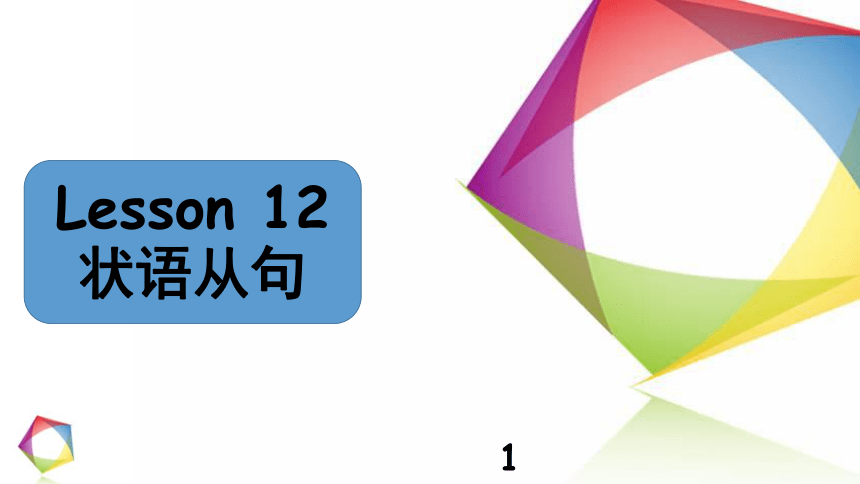 | |
| 格式 | pptx | ||
| 文件大小 | 268.9KB | ||
| 资源类型 | 试卷 | ||
| 版本资源 | 通用版 | ||
| 科目 | 英语 | ||
| 更新时间 | 2022-04-11 14:03:33 | ||
图片预览

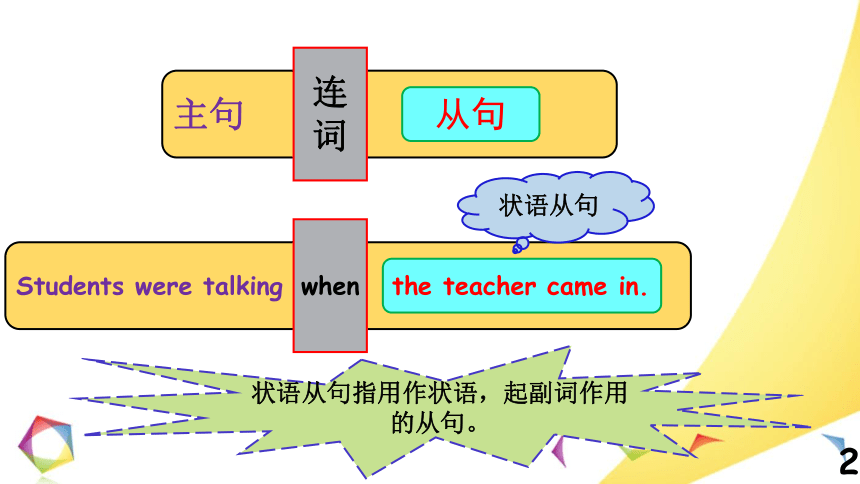
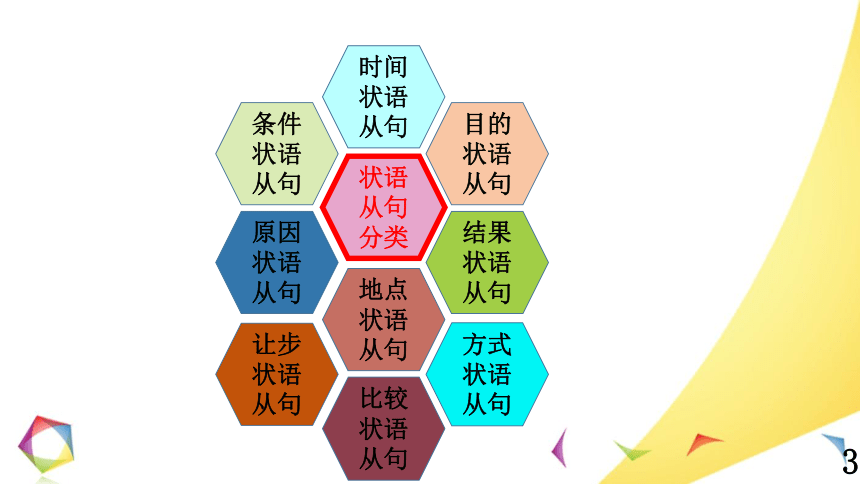
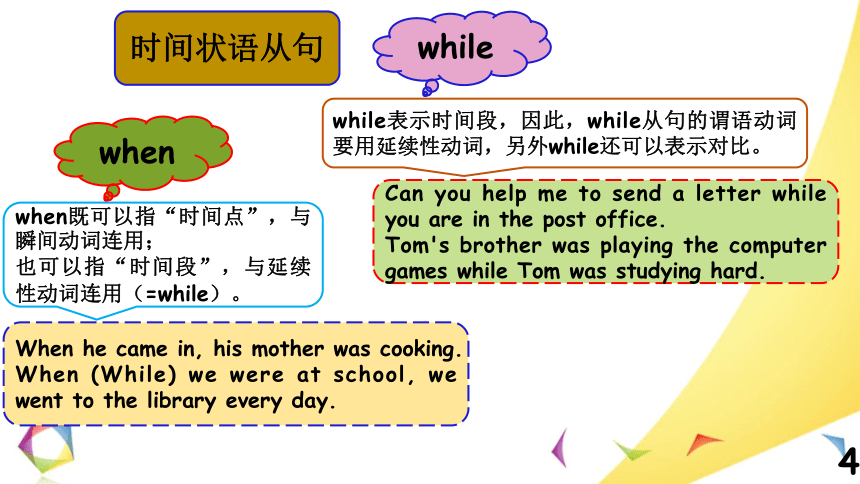
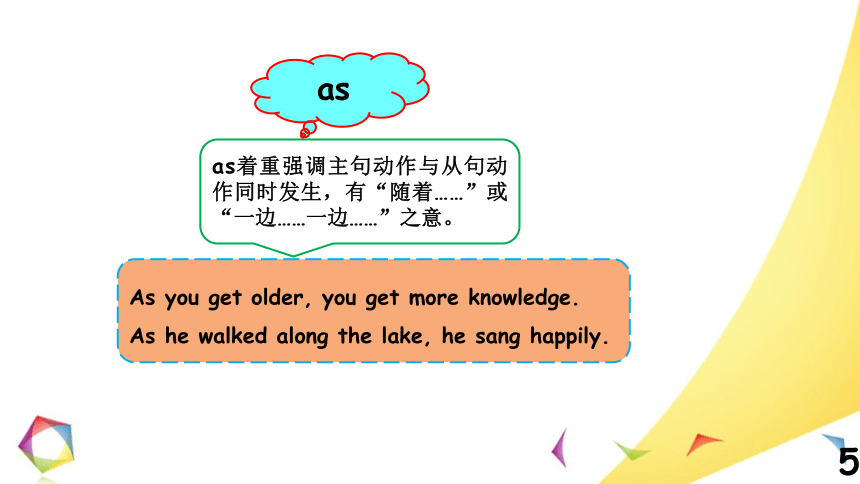
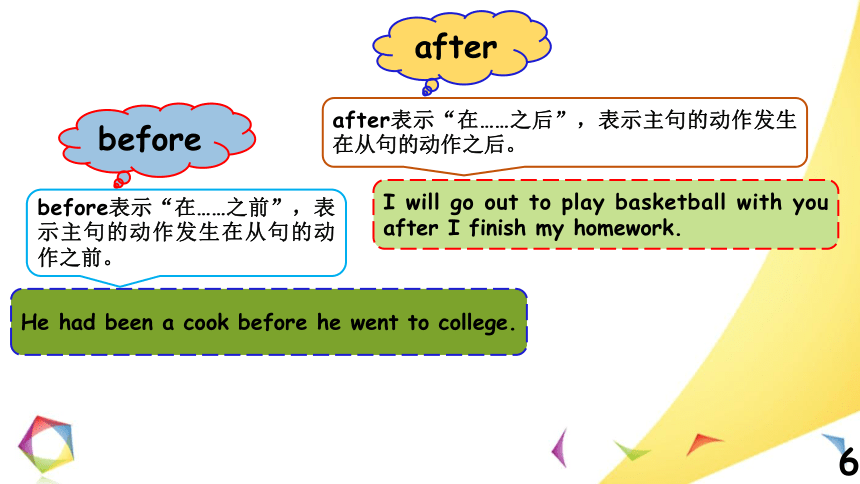
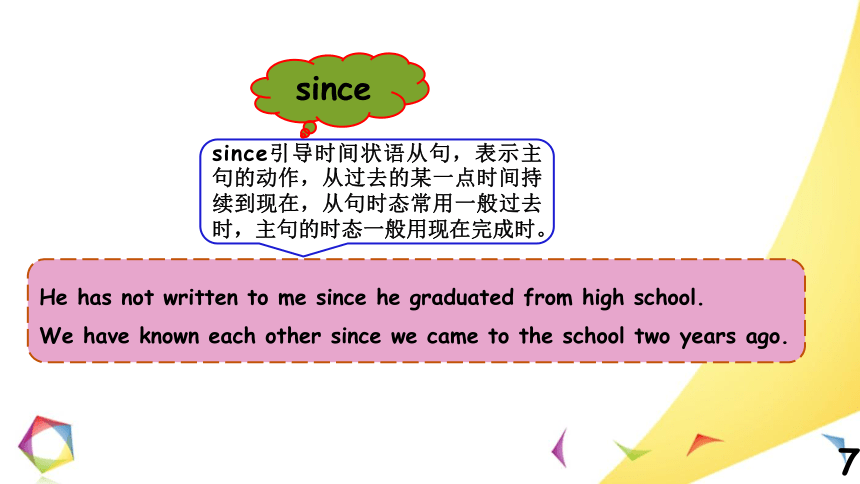
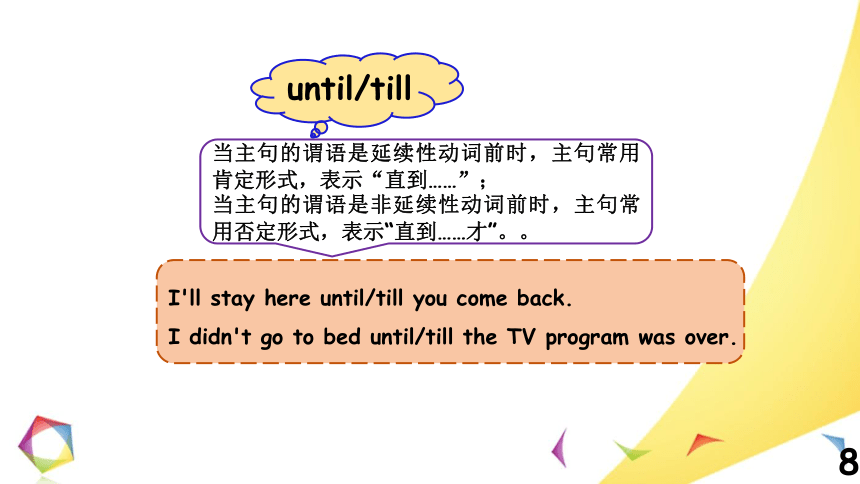
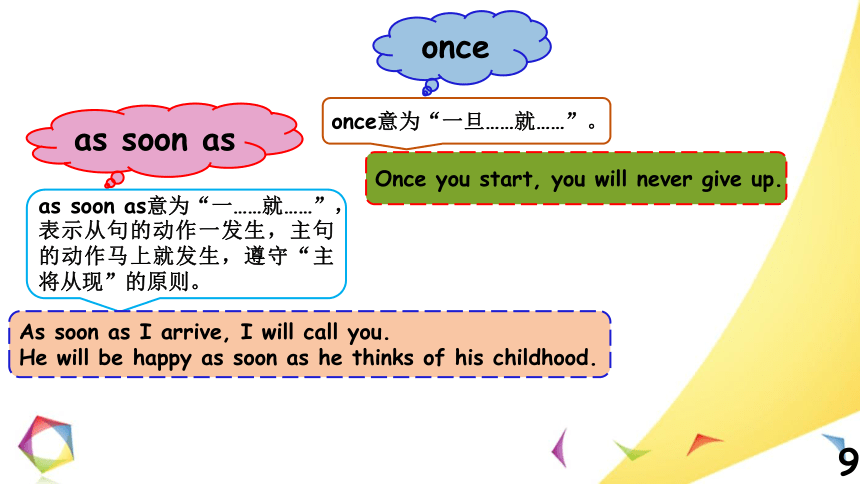
文档简介
(共25张PPT)
Lesson 12状语从句主句从句连词Students were talkingthe teacher came in.when状语从句状语从句指用作状语,起副词作用的从句。状语从句分类结果状语从句地点状语从句目的状语从句条件状语从句时间状语从句原因状语从句让步状语从句比较状语从句方式状语从句时间状语从句whenwhen既可以指“时间点”,与瞬间动词连用;也可以指“时间段”,与延续性动词连用(=while)。When he came in, his mother was cooking.When (While) we were at school, we went to the library every day.whilewhile表示时间段,因此,while从句的谓语动词要用延续性动词,另外while还可以表示对比。Can you help me to send a letter while you are in the post office.Tom's brother was playing the computer games while Tom was studying hard.asas着重强调主句动作与从句动作同时发生,有“随着……”或“一边……一边……”之意。As you get older, you get more knowledge.As he walked along the lake, he sang happily.beforebefore表示“在……之前”,表示主句的动作发生在从句的动作之前。He had been a cook before he went to college.I will go out to play basketball with you after I finish my homework.afterafter表示“在……之后”,表示主句的动作发生在从句的动作之后。sincesince引导时间状语从句,表示主句的动作,从过去的某一点时间持续到现在,从句时态常用一般过去时,主句的时态一般用现在完成时。He has not written to me since he graduated from high school.We have known each other since we came to the school two years ago.until/till当主句的谓语是延续性动词前时,主句常用肯定形式,表示“直到……”;当主句的谓语是非延续性动词前时,主句常用否定形式,表示“直到……才”。。I'll stay here until/till you come back.I didn't go to bed until/tillthe TV program was over.as soon asas soon as意为“一……就……”,表示从句的动作一发生,主句的动作马上就发生,遵守“主将从现”的原则。As soon as I arrive, I will call you.He will be happy as soon as he thinks of his childhood.Once you start, you will never give up.onceonce意为“一旦……就……”。地点状语从句wherewhere引导地点状语从句,表示“在……地方”。Put the book back where it is.Where there is a will, there is a way.原因状语从句because表示直接的原因,语气最强,常用来回答由why引导的问句。—Why didn't you go there —Because I didn't want to.Water is very important because we can't live without it.since往往表示众所周知的原因,常译为“既然,由于”,since引导的从句通常位于主句之前。Since you come, wait for more time please.sincebecause和so不能同时在一个句子中出现,两者只能出现其一。Because he spends little time learning English, he fails in the exam.=He spends little time learning English, so he fails in the exam.asas表示原因时,语气比because和since都弱,引导的从句位于主句前后均可。As she has no car, she can't get there easily.I stopped to rest, for I was very tired.forfor是并列连词,语气最弱,表示对前面的分句加以解释或表示推断出的原因,多用于书面语中。for所连接的分句只能位于句尾,前面用逗号分开。条件状语从句ifif引导条件状语从句,表示“如果”。What shall we do if it snows tomorrow Don't leavehereunless I tell you to.unlessunless引导条件状语从句,表示“除非、如果不”相当于if not。主将从现as long asas long as引导条件状语从句,表示“只要”。I will go there as long as he invites me.“祈使句 + and/or+ 陈述句”结构相当于一个带有条件状语从句的复合句。Hurry up, or you'll be late.=If you don't hurry up, you'll be late.Study hard and you will pass the exam.=If you study hard, you will pass the exam.目的状语从句so that/in order that目的状语从句通常由 so that, in order that引导,表示“为了、以便”,通常位于主句之后,从句中多用can, will, may, should等情态动词。He studies hard so that he could find a good job in the future.We used the computer in order that we might save time.结果状语从句如此……以致于sucha/anadj可数名词单数adj可数名词复数adj不可数名词that从句Kathy is such a lovely girl that we all like her.These were such difficult questions that none of us could answerthem.We had such terrible weather that we couldn't finish the work on time.so形容词/副词adj可数名词单数many/few可数名词复数that从句Kathy is so lovely that we all like to be with her.Kathy is so lovely a girl that we all like to be with her.He made so many mistakes that he failed the exam once again.There's so little time left that we have to speed up.a/anmuch/little不可数名词让步状语从句though/althoughthough和although意义一样,都作“虽然,即使”讲,表示让步,一般情况下可互换使用。但although语气较强,多置于句首。Although/Though he is very old, he is quite strong.though/although引导让步状语从句时,主句中不可出现but,但可以用yet,still等。Though it rained hard outside, (yet/still) he insisted on going out.=It rained hard outside, but he insisted on going out.even if/even though这两个短语表示语气更强的让步,意为“即使”。We will make a trip even though/even if the weather is bad.“疑问词+-ever”或者“no matter+疑问词”“no matter+疑问词”或“疑问词-ever”的含义为“无论……都……;不管……都……”。Whatever/No matter what happens, he will help you. Whenever/No matter when she comes, she brings a friend.However/No matter how cold it is, she always goes swimming.比较状语从句than/as...as比较状语从句由than和as...as引导。The house is three times as big as ours.The piano is more expensive than I expected.方式状语从句asas引导的方式状语从句通常位于主句后,意思是“正如、就像。When you are in Rome, do as Romans do.as if和as though引导方式状语从句,意为"仿佛……似的","好像……似的"。It looks as if/though it is going to rain soon.as if/as though沙场大点兵1. Read it aloud _____ the class can hear you.A. so that B. ifC. when D. although2. It is about ten years _____ I met you last.A. since B. forC. when D. as3. _____the workers were tired,they kept building the bridge.A. When B. BecauseC. Though D. As4. I learned a little Russian _____ I was at middle school.A. though B. althoughC. as if D. when5. She was _____ tired _____ she could not move an inch.A. so, that B. such, that C. very, that D. so, as6. We didn't go home _____ we finished the work.A. since B. until C. because D. though7. You'll miss the train ______ you hurry up.A. unless B. as C. if D. until8.You may arrive in Beijing early ___ youdon'tmind taking the night train.A. that B. though C. unless D. if9._____ we stood at the top of the building, the people below were hardly visible.A. As B. Although C. Unless D.As if10. If we work with a strong will, we can overcome any difficulty, _____ great it is.A. what B. how C. however D. whatever
Lesson 12状语从句主句从句连词Students were talkingthe teacher came in.when状语从句状语从句指用作状语,起副词作用的从句。状语从句分类结果状语从句地点状语从句目的状语从句条件状语从句时间状语从句原因状语从句让步状语从句比较状语从句方式状语从句时间状语从句whenwhen既可以指“时间点”,与瞬间动词连用;也可以指“时间段”,与延续性动词连用(=while)。When he came in, his mother was cooking.When (While) we were at school, we went to the library every day.whilewhile表示时间段,因此,while从句的谓语动词要用延续性动词,另外while还可以表示对比。Can you help me to send a letter while you are in the post office.Tom's brother was playing the computer games while Tom was studying hard.asas着重强调主句动作与从句动作同时发生,有“随着……”或“一边……一边……”之意。As you get older, you get more knowledge.As he walked along the lake, he sang happily.beforebefore表示“在……之前”,表示主句的动作发生在从句的动作之前。He had been a cook before he went to college.I will go out to play basketball with you after I finish my homework.afterafter表示“在……之后”,表示主句的动作发生在从句的动作之后。sincesince引导时间状语从句,表示主句的动作,从过去的某一点时间持续到现在,从句时态常用一般过去时,主句的时态一般用现在完成时。He has not written to me since he graduated from high school.We have known each other since we came to the school two years ago.until/till当主句的谓语是延续性动词前时,主句常用肯定形式,表示“直到……”;当主句的谓语是非延续性动词前时,主句常用否定形式,表示“直到……才”。。I'll stay here until/till you come back.I didn't go to bed until/tillthe TV program was over.as soon asas soon as意为“一……就……”,表示从句的动作一发生,主句的动作马上就发生,遵守“主将从现”的原则。As soon as I arrive, I will call you.He will be happy as soon as he thinks of his childhood.Once you start, you will never give up.onceonce意为“一旦……就……”。地点状语从句wherewhere引导地点状语从句,表示“在……地方”。Put the book back where it is.Where there is a will, there is a way.原因状语从句because表示直接的原因,语气最强,常用来回答由why引导的问句。—Why didn't you go there —Because I didn't want to.Water is very important because we can't live without it.since往往表示众所周知的原因,常译为“既然,由于”,since引导的从句通常位于主句之前。Since you come, wait for more time please.sincebecause和so不能同时在一个句子中出现,两者只能出现其一。Because he spends little time learning English, he fails in the exam.=He spends little time learning English, so he fails in the exam.asas表示原因时,语气比because和since都弱,引导的从句位于主句前后均可。As she has no car, she can't get there easily.I stopped to rest, for I was very tired.forfor是并列连词,语气最弱,表示对前面的分句加以解释或表示推断出的原因,多用于书面语中。for所连接的分句只能位于句尾,前面用逗号分开。条件状语从句ifif引导条件状语从句,表示“如果”。What shall we do if it snows tomorrow Don't leavehereunless I tell you to.unlessunless引导条件状语从句,表示“除非、如果不”相当于if not。主将从现as long asas long as引导条件状语从句,表示“只要”。I will go there as long as he invites me.“祈使句 + and/or+ 陈述句”结构相当于一个带有条件状语从句的复合句。Hurry up, or you'll be late.=If you don't hurry up, you'll be late.Study hard and you will pass the exam.=If you study hard, you will pass the exam.目的状语从句so that/in order that目的状语从句通常由 so that, in order that引导,表示“为了、以便”,通常位于主句之后,从句中多用can, will, may, should等情态动词。He studies hard so that he could find a good job in the future.We used the computer in order that we might save time.结果状语从句如此……以致于sucha/anadj可数名词单数adj可数名词复数adj不可数名词that从句Kathy is such a lovely girl that we all like her.These were such difficult questions that none of us could answerthem.We had such terrible weather that we couldn't finish the work on time.so形容词/副词adj可数名词单数many/few可数名词复数that从句Kathy is so lovely that we all like to be with her.Kathy is so lovely a girl that we all like to be with her.He made so many mistakes that he failed the exam once again.There's so little time left that we have to speed up.a/anmuch/little不可数名词让步状语从句though/althoughthough和although意义一样,都作“虽然,即使”讲,表示让步,一般情况下可互换使用。但although语气较强,多置于句首。Although/Though he is very old, he is quite strong.though/although引导让步状语从句时,主句中不可出现but,但可以用yet,still等。Though it rained hard outside, (yet/still) he insisted on going out.=It rained hard outside, but he insisted on going out.even if/even though这两个短语表示语气更强的让步,意为“即使”。We will make a trip even though/even if the weather is bad.“疑问词+-ever”或者“no matter+疑问词”“no matter+疑问词”或“疑问词-ever”的含义为“无论……都……;不管……都……”。Whatever/No matter what happens, he will help you. Whenever/No matter when she comes, she brings a friend.However/No matter how cold it is, she always goes swimming.比较状语从句than/as...as比较状语从句由than和as...as引导。The house is three times as big as ours.The piano is more expensive than I expected.方式状语从句asas引导的方式状语从句通常位于主句后,意思是“正如、就像。When you are in Rome, do as Romans do.as if和as though引导方式状语从句,意为"仿佛……似的","好像……似的"。It looks as if/though it is going to rain soon.as if/as though沙场大点兵1. Read it aloud _____ the class can hear you.A. so that B. ifC. when D. although2. It is about ten years _____ I met you last.A. since B. forC. when D. as3. _____the workers were tired,they kept building the bridge.A. When B. BecauseC. Though D. As4. I learned a little Russian _____ I was at middle school.A. though B. althoughC. as if D. when5. She was _____ tired _____ she could not move an inch.A. so, that B. such, that C. very, that D. so, as6. We didn't go home _____ we finished the work.A. since B. until C. because D. though7. You'll miss the train ______ you hurry up.A. unless B. as C. if D. until8.You may arrive in Beijing early ___ youdon'tmind taking the night train.A. that B. though C. unless D. if9._____ we stood at the top of the building, the people below were hardly visible.A. As B. Although C. Unless D.As if10. If we work with a strong will, we can overcome any difficulty, _____ great it is.A. what B. how C. however D. whatever
同课章节目录
- 词法
- 名词
- 动词和动词短语
- 动词语态
- 动词时态
- 助动词和情态动词
- 非谓语动词
- 冠词
- 代词
- 数词和量词
- 形容词副词及其比较等级
- 介词和介词短语
- 连词和感叹词
- 构词法
- 相似、相近词比较
- 句法
- 陈述句
- 一般疑问句和否定疑问句
- 特殊疑问句及选择疑问句
- 反意疑问句
- 存在句(There be句型)
- 宾语从句
- 定语从句
- 状语从句
- 主谓一致问题
- 简单句
- 并列句
- 复合句
- 主谓一致
- 主、表语从句
- 名词性从句
- 直接引语和间接引语
- 虚拟语气
- 感叹句
- 强调句
- 倒装句
- 祈使句
- 句子的成分
- 句子的分类
- 题型专区
- 单项选择部分
- 易错题
- 完形填空
- 阅读理解
- 词汇练习
- 听说训练
- 句型转换
- 补全对话
- 短文改错
- 翻译
- 书面表达
- 任务型阅读
- 语法填空
- 其他资料
